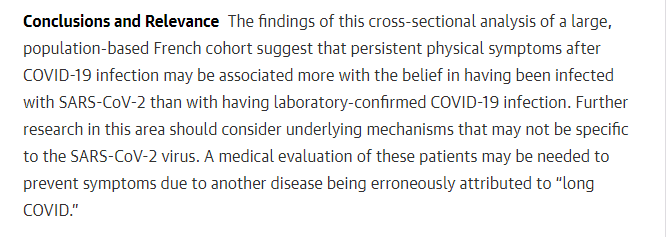In September, the BBC reported, “guidance for UK health workers describes long Covid as symptoms continuing for more than 12 weeks after an infection – severe or mild – which can’t be explained by another cause.”
And the National Health Service (“NHS”) lists 14 symptoms of “long Covid”. Sense of smell is mentioned in the second to last symptom on NHS’s list: “a high temperature, cough, headaches, sore throat, changes to sense of smell or taste.”
The World Economic Forum also published an article stating: “long Covid symptoms include fatigue, breathlessness and ‘brain fog’” quoting a study by Imperial College London which estimated in June that two million adults in England may have long Covid. Imperial’s figures were based on people who reported having had Covid, “either suspected or confirmed by PCR test.”
However, a French study published on Monday found that participants who were laboratory confirmed as having had a Covid infection only suffered persistent anosmia or loss of smell. And, that persistent physical symptoms 10 to 12 months after the Covid pandemic first wave were associated more with the belief in having experienced Covid-19 infection than with having laboratory-confirmed SARS-CoV-2 infection.
The study consisted of 26,823 randomly selected adults aged 18-69 years with the aim to examine the associations of self-reported Covid-19 infection and SARS-CoV-2 serology, or antibody, test results with persistent physical symptoms (eg, fatigue, breathlessness, or impaired attention) in the general population during the Covid pandemic.
Less than half of those with a positive serology test reported having experienced the disease. Conversely, among those who reported having had the disease, approximately half had a negative serology test result, consistent with some findings in clinical settings.
The study concluded that “persistent physical symptoms after Covid-19 infection should not be automatically ascribed to SARS-CoV-2; a complete medical evaluation may be needed to prevent erroneously attributing symptoms to the virus.”
Source:
Matta J, Wiernik E, Robineau O, et al. Association of Self-reported COVID-19 Infection and SARS-CoV-2 Serology Test Results With Persistent Physical Symptoms Among French Adults During the COVID-19 Pandemic. JAMA Intern Med. Published online November 08, 2021. doi:10.1001/jamainternmed.2021.6454

The Expose Urgently Needs Your Help…
Can you please help to keep the lights on with The Expose’s honest, reliable, powerful and truthful journalism?
Your Government & Big Tech organisations
try to silence & shut down The Expose.
So we need your help to ensure
we can continue to bring you the
facts the mainstream refuses to.
The government does not fund us
to publish lies and propaganda on their
behalf like the Mainstream Media.
Instead, we rely solely on your support. So
please support us in our efforts to bring
you honest, reliable, investigative journalism
today. It’s secure, quick and easy.
Please choose your preferred method below to show your support.
Categories: Breaking News, World News


I don’t trust this study at all. They took a very biased tone against patients that made activity and dietary changes, then didn’t appear to further explain themselves. Were patients never leaving their bed or attempting to survive solely on a diet of toffee? Or, were they simply exercising one fewer day a week and cutting out gluten? Who can say. The closest citation to that part of the paper was for a research study on IBS (irritable bowel syndrome). I looked it over and it had an incredibly vague statement in it, alleging that people with IBS were worse off for “maladaptive coping.” I didn’t see an explanation, just further citations. These related to castrophizing and psychosocial issues relating to IBS. Considering the strong connection between the digestive system and anxiety, I’d say more justification is needed before applying these things to COVID, which is cardiovascular/respiratory, not digestive in nature.
Further, I know that “long COVID” is a term that people have been generally using to describe lingering symptoms, but it’s important to understand how slanted it is. “Long” is an open-ended word. “Long” can be five months or five years or fifty years. It’s indeterminate. And, because of that, it’s mentally intimidating. The “conflicts of interest” area at the bottom of the study is quite long and lists a bunch of pharmaceutical companies that benefit directly from scaring people about COVID. I don’t think that’s any coincidence.
I SMELL A RAT